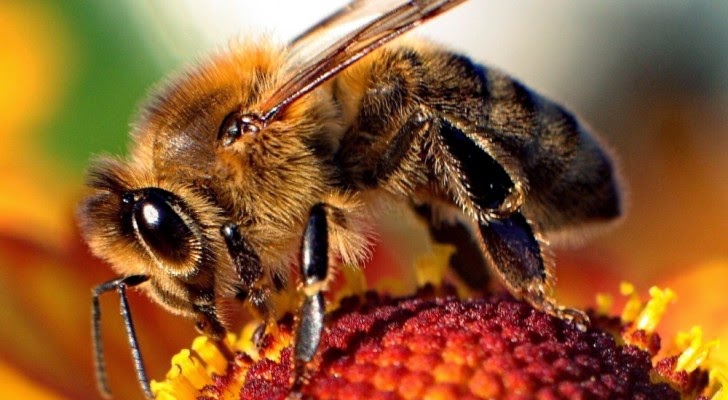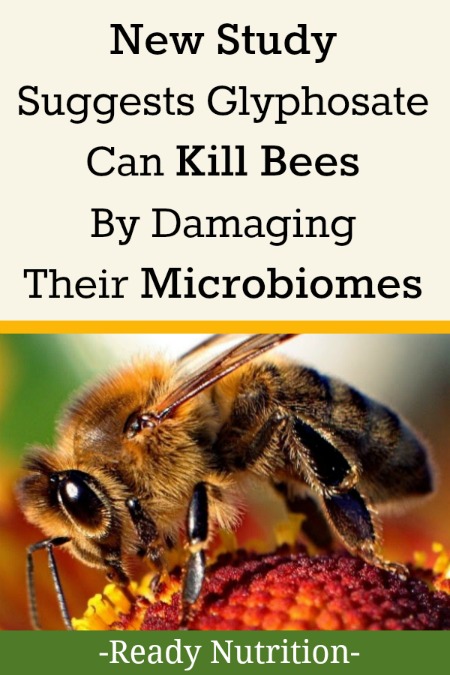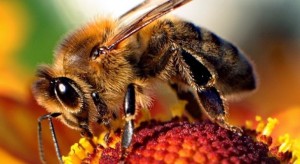
The research, conducted at The University of Texas at Austin and published in the journal Proceedings of the National Academy of Sciences [2] on September 24, shows that honey bees exposed to glyphosate lose some of the beneficial bacteria in their guts. This makes the bees more susceptible to infection and death from harmful bacteria.
Scientists believe this is evidence that glyphosate might be contributing to the years-long decline of honey bees [3] and native bees around the world.
In a press release [4], the researchers explained their findings:
Because glyphosate interferes with an important enzyme found in plants and microorganisms, but not in animals, it has long been assumed to be nontoxic to animals, including humans and bees. But this latest study shows that by altering a bee’s gut microbiome — the ecosystem of bacteria living in the bee’s digestive tract, including those that protect it from harmful bacteria — glyphosate compromises its ability to fight infection.
To conduct the study, the research team took 2,000 honey bees from hives at the University of Texas campus and fed them either a low dose of glyphosate, a high dose, or a glyphosate-free syrup.
It didn’t take long for glyphosate to cause problems for the bees involved in the study: after only three days of exposure at levels known to occur in crop fields, yards, and roadsides, the herbicide significantly reduced healthy gut microbiota. “Of eight dominant species of healthy bacteria in the exposed bees, four were found to be less abundant. The hardest hit bacterial species, Snodgrassella alvi, is a critical microbe that helps bees process food and defends against pathogens,” the researchers reported.
When later exposed to bacteria called Serratia marcescens, an “opportunistic” pathogen that takes advantage of hosts that already have weaknesses (like lowered immunity or a disrupted gut microbiota), the bees were far more likely to die compared with bees with healthy guts:
Serratia is a widespread opportunistic pathogen that infects bees around the world. About half of bees with a healthy microbiome were still alive eight days after exposure to the pathogen, while only about a tenth of bees whose microbiomes had been altered by exposure to the herbicide were still alive.
“Studies in humans, bees, and other animals have shown that the gut microbiome is a stable community that resists infection by opportunistic invaders,” said lead researcher and professor Nancy Moran. “So if you disrupt the normal, stable community, you are more susceptible to this invasion of pathogens.”
Side note about Serratia marcescens: you likely have encountered it before in your home. It is commonly known as “pink mold”, but it is not actually mold. It’s a pink, pink-orange, or orange discoloration and slimy biofilm (bacterial colony) that likes to live in bathrooms (especially on tile grout, in showers and tubs, and in sinks). It feeds on soap and shampoo residue. It can cause infections in wounds, in the urinary tract, respiratory tract, and in the eyes. It is also a rare cause of pneumonia and meningitis. To learn how to safely remove it from surfaces in your home, check out Solved! How to Get Rid of Pink Mold in the Shower for Good [5].
What do the findings of this study mean?
Years ago, beekeepers in the US began finding their hives destroyed by what became known as “colony collapse disorder.” Millions of bees disappeared, leaving farms with fewer pollinators for their crops.
Various possible causes of this mysterious (and tragic) phenomenon have been discussed, including exposure to pesticides or antibiotics, habitat loss, and bacterial infections.
This new study adds herbicides to the list of possible culprits.
“Because native bumblebees have microbiomes similar to honey bees, it is likely that they would be affected by glyphosate in a similar way,” Moran noted.
The researchers recommend that farmers, landscapers, and homeowners avoid spraying glyphosate-based herbicides on flowering plants that bees are likely to visit.
“We need better guidelines for glyphosate use, especially regarding bee exposure, because right now the guidelines assume bees are not harmed by the herbicide,” said [4] Erick Motta, the graduate student who led the research along with Moran. “Our study shows that’s not true.”
What YOU can do to help bees
Glyphosate isn’t the only thing that can harm bees. Pesticides can as well. In particular, steer clear of systemic pesticides such as neonicotinoids [6], which are taken up by the vascular systems of plants. This means bees and other pollinators are exposed to the poison long after a product has been applied when they feed on the plant’s nectar and pollen.
- When purchasing plants, ask your garden supplier to ensure that they have not been treated with neonicotinoids or other systemic pesticides.
- Instead of using pesticides, use a “companion planting” system to discourage pests from making an all-you-can-eat buffet of your garden. For more on sustainable pest management, please see this guide [7] from Xerces Society.
- Provide flowering plants [8] from April through October (early spring through fall).
- Fruit trees typically bloom early in the spring, which is a critical time for foraging bumblebee queens. Try to ensure that your new plants have not been treated with neonicotinoids or other systemic pesticides. Avoid invasive non-native plants and remove them if they invade your yard.
- Plant native wildflowers that bloom throughout the year in containers on your windowsill, porch or deck, or in your garden. Since these flowers attract bumblebees and other pollinators, they will enhance pollination of your fruit and vegetable crops too.
- Because most queens overwinter in small holes on or just below the ground’s surface, avoid raking, tilling or mowing your yard until April or May. If you do need to mow, do so with the mower blade set at the highest safe level.
- Many native bumblebees build their nests in undisturbed soil, abandoned rodent burrows, or clumps of grass. Preserve un-mown, brushy areas and do not destroy bumblebee nests when you find them. Reduce soil tilling and mowing where bumblebees might nest.
- Here’s how to protect bee habitats during the fall and winter months: Put Down Those Pruners: Pollinators Need Your ‘Garden Garbage!’ [9]
Remember – our very existence relies on bees. One-third of all the food we eat comes from plants that are pollinated by insects, and 80% of those crops are pollinated by bees [10]. It also has big implications for our meat supply as well: plants (like alfalfa) that feed animals are pollinated by bees.
We can all do our part to protect the tiny buzzing creatures.

